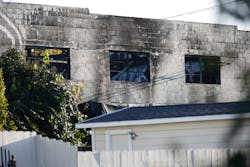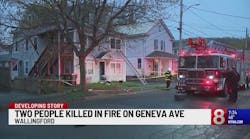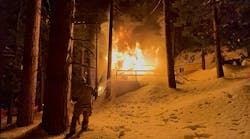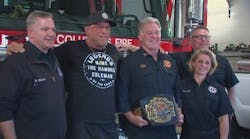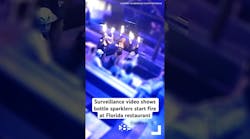Fire departments nationwide continuously fight for funding, staffing, and, for some, their very survival, in a nation that increasingly appears apathetic to their neighborhood firefighter. While they smile and wave, and genuinely appreciate their folklore heroes, when it comes to providing financial support through fees or increased taxes, more questions come forth than checks in the “Vote Yes” box.
Another fight our nation’s fire service continues to fight is for increased sprinkler system codes in their local code books. This is completely baffling as sprinkler systems are to the fire service what a cure for cancer would be to the medical profession. Civilians and firefighters die in buildings that lack the very sprinkler systems that would have certainly saved their lives. Such losses of life are what our citizens would deem a “needless loss of life” if the cause of death was anything other than fire, which to many of our citizens is a simple misfortune that happens now and again—to other people.
There is an obvious disconnect between today’s fire service and a society whose values and priorities have changed dramatically over the last few decades. We now live in a society whose attention is drawn to national news stories flashing across social media newsfeeds, and whose focus and passion for a cause lasts just a few months longer than those headlines or until another dramatic story unfolds to grab that caring passion.
In the fire/EMS profession we call these moments “teachable moments,” when an event occurs that has the public’s attention and an opportunity presents itself to teach an important lesson to a now receptive and attentive audience; such as after a fire fatality, a fire department can capitalize on the media’s attention and the public’s emotional concern to talk about smoke detectors. In the public administration profession they refer to these moments as “an idea whose time has come,” and a once unfavorable or questionable policy can again be introduced during a time when the public’s view may be more receptive; for example, those politicians who are in favor of more gun control will utilize an incident involving shooting to express the need for a more stringent gun control policy.
The fire service is in the middle of such a moment after the tragedy in Oakland, CA, where 36 people (and counting) died during an electronic music party in an illegal and unpermitted “artist collective” called the Ghost Ship. Once again there was a lack of a sprinkler system, fire alarms, and exits, in a warehouse that is being described as a “fire trap.” Such fatalities are nothing new to those of us in the fire service as they become just another reoccurring preventable tragedy that we have continuously warned was coming. This is akin to firefighters in a room full of people screaming at the top of their lungs about the impending risks and dangers lying ahead, only for all those people in the room to continue laughing and carrying on conversations completely oblivious to the commotion.
The teachable moment
Only now, with the tragic events in Oakland garnering national attention, that room has quieted down and all eyes are on the fire service to make sense of, and explain, what has just occurred and to reassure them something can be and will be done. This is that “teachable moment” or that “idea whose time has come.” Every fire department in the nation should be reaching out to their local media to bring this event to their local community to talk about the challenges and needs of their fire department, or the need for fire codes and sprinkler systems, or the importance of a strong inspection program, or preferably all of the aforementioned. Now is the time.
How? First you need to be educated on fire service history. While this incident in Oakland appears to most people outside of the fire service as an isolated incident, those of us in the fire service profession knows this is not the case. This is what makes Oakland an interest to local news; the fact that this is a reoccurring national problem that may lie in their very community if action and support is not given. Deadly events such as the Iroquois Theater fire, the Coconut Grove fire, the Beverly Hills Supper Club fire, the Happy Land club fire, the Station Nightclub fire all had reoccurring themes that played out once again in Oakland. In essence, those who died in Oakland died for known and preventable causes that are being largely ignored, or in other words, to break it down into general terms that the public understands—this was a needless loss of life.
Next: Reach out to your local media and paint the Ghost Ship in that light. Educate them on the dangers in Oakland that also reside in your community due to lack of sprinkler systems, or lack of inspectors, or the need for increased fire prevention programs. Reach out and show your community that your fire department is the solution to the problem now that this event has the nation’s attention, emotions, and fears and are ready for answers and action.
Some may frown upon taking advantage of the Oakland tragedy in such a manner, however doing so is not for personal gain but for public gain and public safety. If your department is successful in turning this tragedy into a local news story, and it saves one life, then those who died in Oakland will not have died in vain. Whether such a news story will turn your community’s attention towards a similar fire trap, gain support for a new inspector, start the discussion on sprinkler codes, or even if your citizens start checking exits when in public buildings, a difference can be made.
Currently the code books are filled with the blood of victims whose tragedies resulted in new codes or changes to the codes. Sadly, those who died in buildings, both civilian and firefighter alike, that lacked a sprinkler system cry out for justice, and it is now up to us to get those voices heard. Now is the time.
DANIEL BYRNE is an Engineer/Paramedic and Community Support Officer for the Burton Fire District, Beaufort County, SC, and an Assistant Chief of Training for the Georgia Air National Guard 165th Fire Department. Byrne is a third generation firefighter and holds both an associates and bachelors degree in Fire Science, and a Fire Officer and Fire Instructor III certified. Byrne has received state and local awards for public relations and educational programs as well as community partnerships; and has been both a conference presenter and keynote speaker. You can connect with Byrne on Twitter at: @FireService360 or on Facebook at: FireService360.
